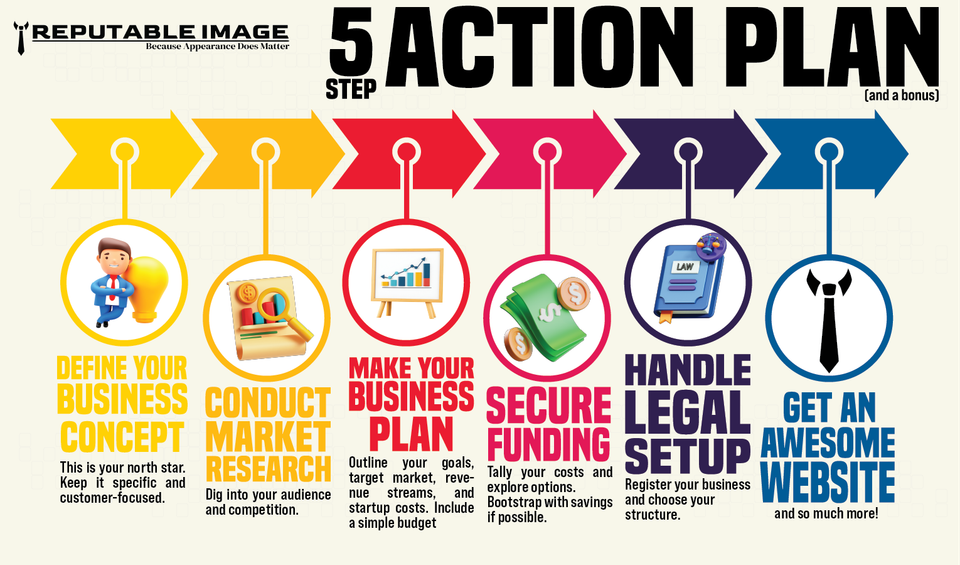
WHERE TO START?
Initial Considerations on starting a small business
You have the idea. Your mind explodes with ambition and possibilities. Some friends support you. Others will tell you that you are crazy. You sort of agree with them, but at the same time are so excited about this idea! It might work! Or not?
Launching a small business is both an exciting and challenging endeavor. Before diving in, aspiring entrepreneurs must weigh several key considerations to lay a solid foundation for success. From identifying a viable idea to understanding financial and legal requirements, these early steps can determine whether a business thrives or falters. Let’s explore the critical initial considerations. We also provide you with a practical 5-step action plan to get started. If you’re building your brand, start with basics like a clear logo—see A Guide to Effective Logo Design.
✓ Initial Considerations
1. Market Demand and Idea Validation: The cornerstone of any small business is a product or service that people want. Begin by researching your target market to confirm demand. Are you solving a problem or filling a gap? Look at competitors—too many might signal a saturated market, while too few could indicate low interest. Tools like surveys, focus groups, or even casual conversations with potential customers can validate your idea. For example, if you’re considering a local bakery, check if there's an appetite for specialty items like gluten-free pastries that others aren’t offering.
2. Personal Skills and Passion: Assess your strengths and interests. A small business demands hands-on involvement, especially in the early days, so aligning it with your skills and enthusiasm can sustain you through tough times. If you’re a graphic designer with a love for branding, starting a freelance design firm might make more sense than opening a coffee shop with no barista experience. Passion fuels persistence, but skills ensure competence.
3. Financial Feasibility: Money is a make-or-break factor. Calculate startup costs—equipment, inventory, marketing—and estimate ongoing expenses like rent, utilities and payroll. Compare this to your available capital, whether personal savings, loans, or investor funds. A 2023 Small Business Administration report found that 20% of startups fail within their first year, often due to cash flow issues. Be realistic about how long it’ll take to turn a profit and plan for a financial buffer.
4. Time Commitment and Lifestyle Impact: Starting a business isn’t a 9-to-5 gig. Expect long hours, especially at the outset, and consider how this fits your life. If you’ve got young kids or other obligations, can you juggle them with the demands of entrepreneurship? A flexible side hustle like e-commerce might suit someone with limited time, while a retail store might require full immersion.
5. Legal and Regulatory Requirements:
Every business must comply with laws, from registering a business name to obtaining permits. Research your industry’s specifics—food businesses need health inspections, for instance, while consultants might only need a basic license. Tax obligations, like sales tax or employer ID numbers, also vary by location and structure (sole proprietorship, LLC, etc.). Ignoring these can lead to fines or shutdowns, so clarity here is non-negotiable.
As you can see, the idea, while the most important asset in your startup, depends solely on its execution in order to be successful. If you believe in it strong enough to put some skin in it, here is a five-step plan to help you in those critical initial times.

1. Define Your Business Concept Write a clear, concise description of what you’ll offer, who you’ll serve, and why they’ll buy from you. For example: “A mobile pet grooming service for busy professionals in urban areas, offering convenience and premium care.” This is your north star—keep it specific and customer-focused.
2. Conduct Market Research Dig into your audience and competition. Use free tools like Google Trends or social media polls to gauge interest. Visit local competitors or browse their online reviews to spot weaknesses you can exploit. Aim for at least 10-20 data points (e.g., customer feedback, competitor pricing) to inform your strategy.
3. Create a Basic Business Plan Draft a one-page plan outlining your goals, target market, revenue streams, and startup costs. Include a simple budget: if you need $5,000 for equipment and $2,000 for marketing, where’s it coming from? This doesn’t need to be fancy—think of it as a roadmap to refine later.
4. Secure Funding Tally your costs and explore options. Bootstrap with savings if possible, or pitch to friends and family for small loans. For bigger needs, look into SBA microloans (up to $50,000) or crowdfunding platforms like Kickstarter. Set a firm amount—say, $10,000—and a timeline to raise it, like 60 days.
5. Handle the Legal Setup Register your business with your state (fees typically range from $50-$200). Choose a structure—LLC for liability protection is popular—and get an EIN from the IRS (free, online). Check local government sites for permits or licenses, and open a business bank account to keep finances separate. Aim to complete this within 2-3 weeks.
Starting a small business is a leap of faith backed by preparation. By addressing demand, skills, finances, time, and legalities upfront, you minimize risks and maximize clarity. The 5-step plan turns these considerations into action, offering a structured path from idea to launch. Success isn’t guaranteed, but with diligence and adaptability, you’ll be well-positioned to build something lasting. Ready to take the plunge? Start with Step 1 today—your future business awaits.
You might be wondering, "and what about Step 6?" That's building a strong online presence!! Contact Reputable Image and get a free demo for your business website to kickstart your digital journey!
